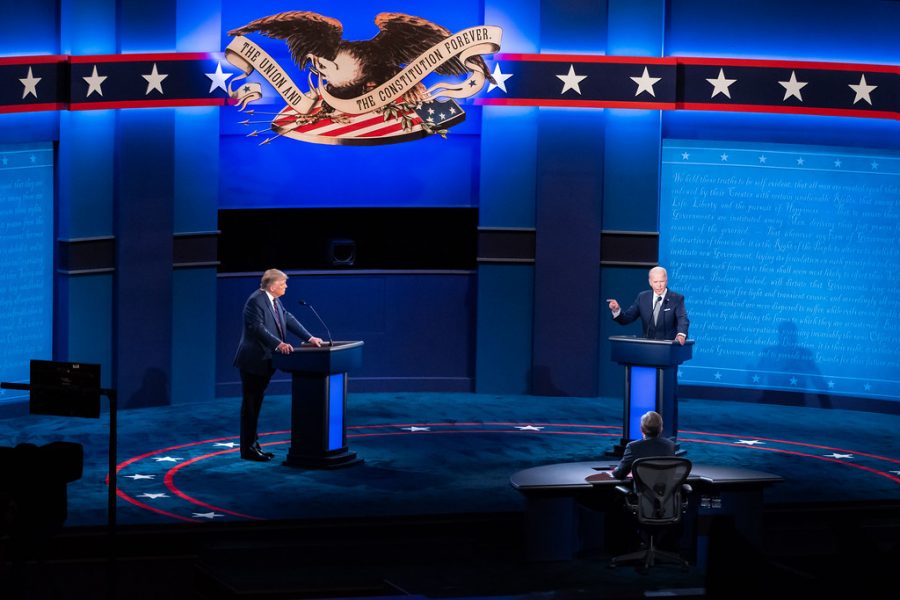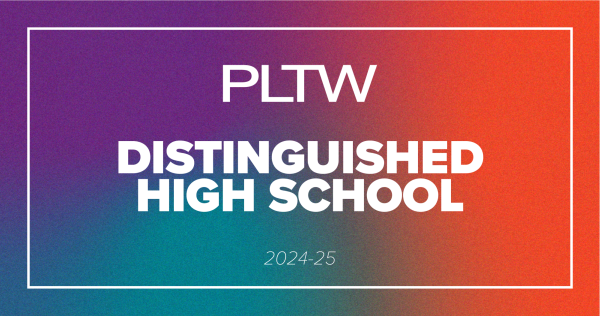Recap: the first 2020 Presidential Debate
A simplified summary of the first presidential debate of the 2020 election, organized by topic.
President Donald Trump and former Vice President Joe Biden at their first presidential debate.
The First 2020 Presidential Debate was held yesterday, Sep. 29, 2020, at Case Western Reserve University in Cleveland, Ohio. Chris Wallace moderated the debate between Republican nominee President Donald Trump and Democratic nominee former Vice President Joe Biden, who were each given two minutes to respond to the primary question without interruption before entering open discussion for the remainder of the segment. The six primary topics covered were the Supreme Court, COVID-19, the economy, race and violence, a review of the candidates’ records, and election integrity. Here is a brief overview of the main points the nominees shared last night.
Supreme Court
In light of Justice Ruth Bader Ginsburg’s death, the nominees were asked to reflect upon how a new judge should be appointed.
Trump: President Trump spoke in favor of his nominee, Amy Coney Barrett, describing her as “good in every way” and someone who would be as fit for the job as anyone who has served on the court before. He stated that because he won the election and is in power, his party “has the right to choose her.”
Biden: Vice President Biden noted that Americans should have a say in who they elect into the Supreme Court, which is a power they gain by voting for senators and the President of the United States. However, because this is an election year, Biden emphasized that many people have voted, and “[they] should wait and see what the outcome of this election is” in order to accurately represent the American people.
During open discussion, two of the most highlighted topics included the Patient Protection and Affordable Care Act (ObamaCare) and Roe v. Wade. Trump was pushed to share his ideas for a possible future healthcare plan, while Biden promoted the expansion of ObamaCare. It remains unclear what the stakes for these acts are in relation to the ballot, but both candidates referred to them throughout the course of the segment.
COVID-19
The COVID-19 health crisis has been a major talking point for a majority of the election season, and the candidates were asked to share their thoughts on how it should be managed.
Biden: Joe Biden introduced the topic by showing statistics of how many Americans have been contracting the virus and how many deaths have occurred on a large scale. Using Trump’s own words against him, he said that “it is what it is because [Trump is] who [he is].” He transitioned into saying that the government should be providing protective gear, telling them to use the money the House of Representatives has passed to support people. He claims that the government should “fund what needs to be done now to save lives.”
Trump: In response to Biden, Trump prided himself on doing a “phenomenal job” handling the pandemic, calling upon examples of his praise. He argued that Biden never could have done the job the Trump administration did to respond. One of his major claims was that they were “weeks away from a vaccine” and less people are dying of the virus.
Discussion opened up a debate over the safety of a vaccine, with Biden arguing that it is not safe to release a vaccine too soon, while Trump argued that he had been in conversation with researchers who believed they would be able to quickly get it out to the public. Another focus was on a reopening plan for the country—with Biden being more precautious than Trump to rapidly restore the country back to normal. Trump also stated that he was not against masks, but he just selectively chose when to wear them, which Biden criticized as an act of selfishness.
Economy
The moderator stated that the economy seems to be “recovering faster than expected from the shutdown” in this second quarter, and each candidate was asked to describe their plan for recovery.
Trump: Trump argued that he closed down the country at a good time and criticized states that are still on lockdown as simply “hurting people,” comparing the situation to being in prison. He noted that people know what to do to keep themselves safe, but it is also important to consider the rise of drug and alcohol abuse and how this pandemic has impacted relationships.
Biden: Biden chose to focus on how middle class workers have not been able to benefit and survive as well as millionaires and billionaires, like Trump, have. He said that there should be a focus on the people, and that “you can’t fix the economy until you fix the COVID crisis.” The nominee believes that a re-opening can be made safely by focusing on the needs of the American people.
Open discussion brought up the reports that Trump only paid $750 in federal income tax in 2016, but Trump insisted that he paid “millions of dollars” in income tax, to which Biden retorted, “show us your tax returns.” Biden also discussed his economic plan for the future, stating that they would create “7 million more jobs than [Trump’s] in four years” and an additional “1 trillion dollars in economic growth.” He also said he would eliminate a significant amount of taxes and make rectifications to their values.
Race & Violence
Racial violence and protests have been a large issue in the past few months, and the nominees shared their responses to the rising unrest.
Biden: Biden emphasized the idea of “decency.” He said that this is something “we have never accomplished.” However, he stated that unlike Trump, he had never walked away from the issue after understanding it. He cited examples of Trump moving to a bunker and his actions after the death of George Floyd in support of his argument.
Trump: Donald Trump began his two minutes by recalling how Biden labeled African Americans “super predators” in the past. He argued that he has done more for the African American community and has many people in law enforcement supporting him.
In open discussion, Biden began to discuss the systemic racism in law enforcement and how we need to recognize and battle this, while Trump said that racial sensitivity screenings and education on white privilege were racist themselves. Trump deemed this workplace training as a “radical revolution.” Biden instead stated that he wanted to call all these people together in an attempt to end police brutality.
A major point of focus for the night that caused outrage was a discussion on white supremacy groups, which Trump did not condemn.
Candidates’ Records
The candidates’ records were referenced in an attempt to give them an opportunity to convince people to vote for them. While the conversation was diverted from the original topic, the following quotes highlight messages from each candidate.
Trump: “There has never been an administration that has done what I’ve done.”
Biden: “When I was vice president, we inherited a recession. I was asked to fix it. I did, we left him a booming economy, and he caused a recession.”
The conversation escalated into an unrelated argument between the nominees before they moved on to discussing election integrity.
Election Integrity
A large concern with voting in regards to this election is that people have the option to mail in their ballots, in contrast to typical elections where they go to polls to vote. When asked how they feel about this expanded system, here is how the candidates responded.
Biden: To assure voters, Biden stated that mail-in ballots would not be manipulated, calling upon FBI reports as a support. As a protective measure because of COVID-19, mail-in ballots are available, but he states that people can still go to polling places that will be safe and open on Election Day. He urges people to “show up and vote. You will determine the outcome of this election. Vote. Vote. Vote… Vote whatever way is the best for you.”
Trump: On the contrary, Trump states that the ballots being sent around the country are fraudulent. He also states that it may take a long time for the election results to come out because of the mail-in situation. “It’s a fraud, and it’s a shame” in his opinion, and people should go and vote.
To be continued
The debate came to an end with each candidate being asked if they would accept the results of the election and not declare victory on election night. Trump and Biden each spoke to their supporters and stated that they would accept the results. A message from each candidate is shared below.
Trump: “I am urging my supporters to go into the polls and watch very carefully because that’s what has to happen… If it’s a fair election, I am 100% on board, but if I see tens of thousands of ballots being manipulated, I can’t go along with that.”
Biden: “We count the ballots… Some of these ballots in some of these states can’t even be opened until election day, and if there’s thousands of ballots, it’s going to take time to do it… It’s honest.”
“To be continued” was the final phrase of the night, in reference to the upcoming second presidential debate. It remains unclear when the formal election results will actually be released, but for now, the candidates are urging their supporters to vote.
If you’re interested in voting, register to vote now at vote.org
Your donation will support the student journalists of Neuqua Valley High School. Your contribution will allow us to print our next newspaper edition as well as help us purchase equipment and cover our annual website hosting costs.







Abby MMS • Oct 6, 2020 at 10:35 am
This was a helpful breakdown. I like the format